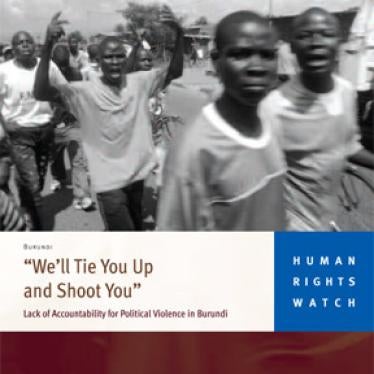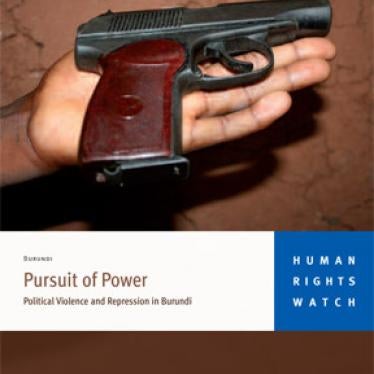(Bujumbura) - With elections approaching in a matter of days, and a worrying increase in political violence, Burundian authorities need to make clear to all political parties and their supporters that no one is above the law, Human Rights Watch said today in a new report. The violence, if left unchecked, could set back Burundi's notable strides toward peace and multiparty democracy after years of civil war, Human Rights Watch said.
The 47-page report, "‘We'll Tie You Up and Shoot You': Lack of Accountability for Political Violence in Burundi," is based on four months of field research in Bujumbura and four rural provinces. The report documents numerous incidents of violence, at least one fatal, carried out by and against members of political parties as a means of settling political scores. Most of the violence has involved the ruling National Council for the Defense of Democracy-Forces for the Defense of Democracy (CNDD-FDD) and its closest competitor in the upcoming elections, the National Liberation Forces (FNL). With a few exceptions, police have failed to carry out thorough investigations, and no one has been prosecuted for the vast majority of these incidents.
"If the police and judicial authorities don't investigate and punish politically motivated attacks, perpetrators will continue to believe they are above the law," said Georgette Gagnon, Africa director at Human Rights Watch. "The situation is already extremely tense, with a number of party militants armed and ready to resort to violence to intimidate their rivals."
Since September 2009, at least seven clashes between militants of different parties have resulted in serious injuries. Most have been between CNDD-FDD and FNL members, both of which have instigated clashes. Other parties, including the Movement for Solidarity and Democracy (MSD), the Union for Peace and Development (UPD), and the Front for Democracy in Burundi (FRODEBU) have accused members of the CNDD-FDD youth league, Imbonerakure, of physically attacking their members. FNL-Iragi, a splinter group associated with CNDD-FDD, has made similar charges against the FNL.
In the most recent case of serious violence, CNDD-FDD and FNL members fought in Ntega, Kirundo province, on May 9. A CNDD-FDD member struck Abraham Nshimirimana, an FNL activist, on the head with a wooden drum. Nshimirimana died from his injuries two days later.
The recent violence could increase during five successive polls scheduled between May and September 2010 unless the law enforcement agencies and political parties themselves take immediate action. One FNL member in Kinama, Bujumbura, told Human Rights Watch, "Even though the government took away our arms, we kept some weapons to protect ourselves. If an FNL member is killed, we will fight to the end. We are all ex-combatants. The CNDD-FDD has weapons, we have weapons."
"These kinds of statements suggest a potential for serious escalation of violence," Gagnon said. "Some party militants are convinced that they are above the law, and others, who have lost faith in the justice system, are taking the law into their own hands."
For example, on May 2, in Kanyosha commune, Bujumbura, a truck driven by supporters of the ruling party pushed its way through a crowd of supporters of the opposition FNL, knocking over and slightly injuring one person. FNL members responded by tearing up a CNDD-FDD flag. CNDD-FDD youths then started beating FNL members.
A 17-year-old girl who was passing by told Human Rights Watch: "I was coming from the FNL office and I saw a group of CNDD-FDD members. One of them knew me and pointed me out. They accused me of carrying grenades to throw at them. They opened my bag to search it, and found an FNL hat. They started beating me." The girl, who said she was beaten by three adult men, had a bruised and swollen eye.
Another victim said: "An Imbonerakure member came to my house and beat me with a hammer, just because I am an FNL member. The police came and intervened. They arrested him briefly, but freed him a few hours later when they learned he was CNDD-FDD." The victim went to the police station the following day to file a complaint. He was handed a summons to deliver himself to the person who had attacked him, whom he was unable to find.
Police told Human Rights Watch they had opened a case file to investigate this incident but did not respond to questions about why the alleged perpetrator was freed.
An FNL member acknowledged that on the same night, members of his party abducted a ruling party member, took him to a party office and beat him. The police intervened, as did high-ranking FNL officials, who convinced their members to free the hostage. When CNDD-FDD members saw how badly the hostage had been beaten, they hit the FNL officials who had negotiated the release and pierced their tires. Police helped rescue one of the FNL officials.
Later that night, after the police left, CNDD-FDD members roamed the neighborhood, stopped vehicles, and beat FNL members whom they found in vehicles or in the street. Police came back at around 1 a.m. and restored order.
"The police have made some progress in intervening in violent incidents, but action seems to stop there," Gagnon said. "The police are not establishing responsibility for these incidents."
In most recent cases of political violence documented in the report, police have failed to hold anyone accountable, have arrested suspects but freed them immediately, or have only arrested opposition members, leaving ruling party members off the hook. The police also need to maintain a preventive presence in neighborhoods known to be prone to election-related violence, Human Rights Watch said.
In a few cases, police appear to have conducted thorough and impartial investigations, though sometimes after false starts. When a grenade was thrown in Kinama on April 10 during a fight between CNDD-FDD and FNL members, police arbitrarily rounded up over a dozen FNL members, imprisoning some of them in an illegal detention site. All were released several days later. However, police told Human Rights Watch on May 6 that after ongoing investigations, they had identified a CNDD-FDD member as a likely suspect and that they would transfer the case file to the prosecutor's office.
The failure to hold perpetrators responsible has been particularly striking in incidents involving high-ranking officials, as in the case of Jean Baptiste Nzigamasabo, a CNDD-FDD member of parliament who, many witnesses said, led a mob of ruling party youth in Kirundo in an attack on FNL members in January. The attackers chanted, "We will tie you up, we will shoot you," as they hurled stones at FNL members, seriously wounding at least two. Nzigamasabo has not been questioned by judicial authorities about his role in the attack.
The Human Rights Watch report describes a number of other incidents between September and April, most in Bujumbura, Kirundo, Cibitoke, and Bubanza. They include the still-unsolved murder of Sylvestre Niyonzima, a UPD activist shot dead in January. An investigation led by the prosecutor of Bubanza has not led to any arrests; Niyonzima's family and colleagues maintain that the murder was politically motivated.
Human Rights Watch warned that truly free and fair elections cannot take place in an atmosphere of fear or denial of justice. The report calls on national and international election observers to not only document cases of political violence, but to monitor victims' access to justice.
"State officials and political party leaders should make clear statements that election-related violence will not be tolerated, and back up these statements by denouncing, investigating, and, where appropriate, prosecuting politically motivated crimes," Gagnon said. "International donors - the primary funders of Burundi's police and justice system - should reinforce this demand for zero tolerance for election violence."
Background
The elections scheduled between May 21 and September 7 follow the end of a nearly 16-year civil war, from 1993 to 2009. They include communal (municipal) elections on May 21; a presidential election on June 28; legislative elections on July 23 and 28; and colline (village) elections on September 7. Candidates from more than 20 parties are running in the elections - a demonstration of progress from one-party rule before the war - though some have faced unlawful restrictions on meetings and have been subjected to arbitrary arrests.
The two major contenders, CNDD-FDD and FNL, are both former Hutu rebel groups that fought a largely Tutsi army during the war. CNDD-FDD disarmed in 2004 and won a clear majority in elections in 2005 that were judged to have been generally free and fair. The FNL continued fighting until 2009.
The military conflict between the two parties has transformed into political competition for the support of the majority Hutu electorate. With many former combatants among supporters of both parties, some still armed, political assassinations and other attacks occurred during the last months of peace negotiations and continued even after the FNL's official disarmament in April 2009. A series of apparently politically motivated murders in 2008 and 2009, documented in Human Rights Watch's 2009 report "Pursuit of Power", have not resulted in any convictions.
Although there have been fewer political murders in recent months, other forms of violence have increased since 2009, with dozens of activists injured since January, often in stone-throwing face-offs, but sometimes by machete or grenade. In several cases, violent incidents that have not been addressed have been followed by further incidents in the same locality or between the same individuals, showing the potential for cycles of revenge.
President Pierre Nkurunziza, who is running for a second term under the CNDD-FDD banner, has recently condemned political violence. After party militants smashed the window of a vehicle belonging to journalists who were covering the April 10 violence in Kinama, the president said at a news conference that those responsible should be punished. On May 5, at the kick-off of the election campaign, he said that any CNDD-FDD member who was found to have participated in such violence would be brought to justice. The FNL leader and presidential candidate, Agathon Rwasa, has also condemned violence in his speeches. However, neither side has facilitated police or judicial investigations into the behavior of its members.








